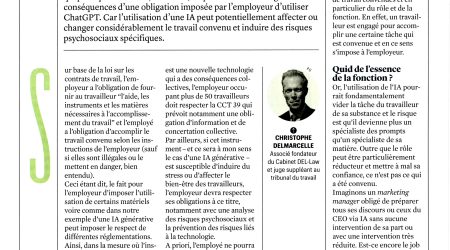Blocked in Ukraine? What are the implications for employers and employees? (Echo 8-3-2022)
Posted the 8 March 2022Due to the severe events currently unfolding in Ukraine, some employees of Belgian companies present in the country for short-term assignments or longer stays may find themselves stranded.
What are the obligations of employers and employees in such a situation, and what are the implications for employment?
First, employers are subject to various obligations regarding workplace welfare and risk prevention, both physical and psychological, as stipulated by the Code of Workplace Well-being. In this context, employers should, as a priority, have recalled their workers at the onset of events, advising and even ordering them to leave the country as quickly as possible or, at the very least, move to a safer region.
Employers must also take necessary measures to assist their employees, providing guidance on steps to take, and, if needed, sending money, supplies, or even food to the extent possible. This is not only about preventing risk but also minimizing its consequences if it materializes.
Employees, for their part, must, as far as possible, inform their employer of their situation, including any inability to resume work, and keep the employer updated. It is advisable to keep proof of such notifications (e.g., email, fax). If an employee is unable to notify their employer, can the employer invoke contract termination for abandonment of work? They might attempt to do so, but courts, particularly given the Ukrainian context, are unlikely to accept that a failure to immediately notify the employer constitutes contract termination. This is especially true if it is the first time the employee has been absent without notifying the employer or if the absence is not overly prolonged.
Contractual obligations, particularly regarding the terms of the assignment or secondment, should also be reviewed to clarify conditions for the employee's return and the costs covered by the employer, including in emergencies like this.
As for the consequences, circumstances in Ukraine, depending on the employee’s location, could constitute force majeure—an unforeseeable event beyond the control of both the employer and employee, temporarily or permanently, wholly or partially, preventing contract performance. In cases of short-term force majeure, the employment contract is suspended, meaning the employee is no longer required to work, and the employer is not required to pay their salary. For long-term force majeure, the contract may end.
However, not all cases of force majeure are equal. The inability to work will depend on the context, activity, and role, evaluated on a case-by-case basis. Employers may request temporary unemployment benefits for force majeure without a qualifying period for employees under Belgian social security.
If force majeure is not established—for example, if the employee is in an area unaffected by conflict and still has the necessary resources—the employee is generally required to continue working. However, they could request unpaid leave for compelling reasons for up to 10 days, which would suspend the contract and their work obligations. Alternatively, they may agree with their employer on a contract suspension.
As for expenses arising from being stranded (accommodation, alternative travel costs), in cases of force majeure, these costs are generally borne by the employee, even if they were on a business trip abroad. However, given the circumstances, it is unlikely that a request for reimbursement of return expenses would be refused.
L'Echo, 8-3-2022
Related articles

Is an employer allowed to mandate the use of artificial intelligence tools by employees ? (Trends, 17-07-2025)

Caution if a former colleague opposed to your employer asks you to testify in their favor
